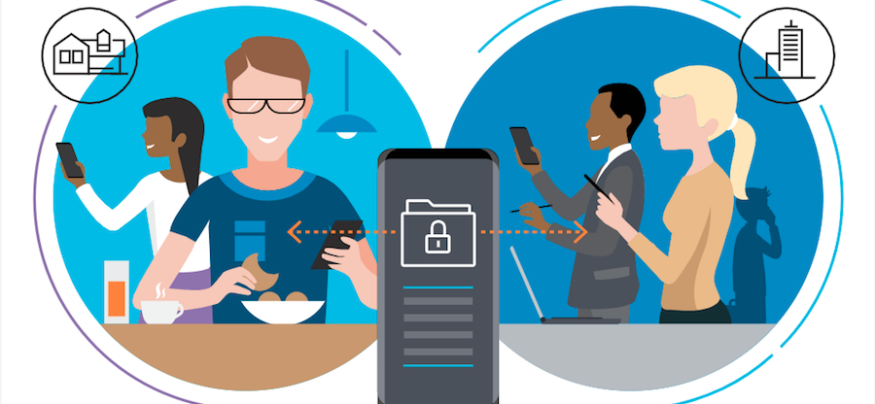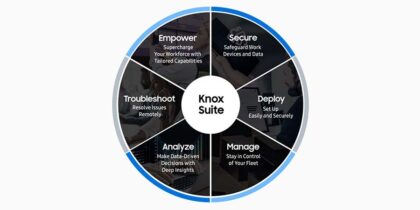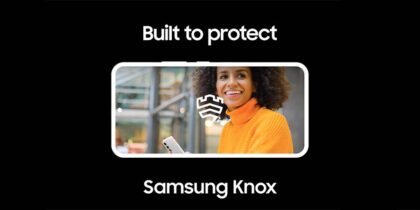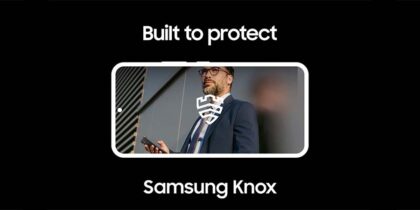As more enterprises look to make a digital transformation, mobile apps are frequently top of mind. To help businesses who are looking to create a high functioning digital workplace, Samsung Business Insights spoke with Christopher White, founder and CEO of The Sneakers Agency, whose focus is on digital strategy and product development. You can hear the full conversation in Episode 7 of the Business Disrupted podcast, How to Develop the Killer App for Business.
Q: What best practices would you recommend a company should adhere to when they start the app development process?
White: It’s really important not to underestimate your user and to do as much user research as you can when getting started. Everything your app does should be to make the life of the user better in some way.
Once you feel you understand your users and their problems, start to put together ideas on how you can solve those problems via a mobile experience. Start with some low fidelity sketches and concepts, show those to users and get feedback, and work your way to a medium fidelity design prototype and get more user feedback. Once you feel confident in your medium fidelity design prototype, then start to look at how you’re going to build the app and think about the full UI/UX design of the app. Once you’ve committed to building it, get it done and into the store so that you can get even more real-world feedback and iterate from there.
Q: What should businesses be thinking about in terms of security when developing a mobile app?
White: When it comes to mobile security there are three main areas of consideration to go over with your engineering team:
- On-Device: Is there sensitive information like passwords or access keys that need to be stored securely on the device, so that if the app is shut down and restarted it’s immediately available? If so, what are the most secure options available for the given platform for storing that information? Are there different options for when the device is locked versus unlocked? Should you also be encrypting this information before storing it securely?
- Over-the-Air (OTA): Do you have sensitive information like passwords or access keys that you need to send OTA? If so, how can you structure your OTA requests to prevent snooping on those requests? You might want to encrypt the information and send it via POST headers as an extra layer of security. Finally, you may want to consider using cert-pinning for an even further layer of secure OTA communication.
- In-the-Cloud: Once data makes it to your servers and database “in the cloud,” what happens there? Where is the data stored and how is it accessed? For sensitive information that is stored in databases, should we be encrypting this information? Will this affect performance?
Q: How important is innovation versus mobile productivity?
White: Every app should first and foremost serve a useful purpose for its users and make their users the hero of the story they’re trying to take users through with their app/service. That said, it’s always a plus to delight users via unique but mobile-friendly UI/UX paradigms, or by making the best use of new frameworks and capabilities, if it makes sense for what your app is trying to achieve.
Listen to the Podcast
Get more insights from Christopher White and ArgoDesign Chief Creative Technologist Jared Ficklin. Download Now
Q: How do you think blockchain could influence the future of mobile devices — either from a product design or application perspective?
White: Blockchain technology is interesting because it opens up new paradigms for how users interact with apps. For instance, you don’t necessarily need users to log in with usernames and passwords when using blockchains for storing information, since that’s a concept associated with centralized systems and databases.
Q: How do product design and an application design need to work together to provide a better overall user experience?
White: By bringing design and engineering together early in the process, you can work through tradeoffs and uncover edge cases that you might not have thought of independently, reducing overall product risk. It’s also good to have one person from each group given the authority to make the final call on all decisions that are required from their group. Weekly sprints where design and engineering are working together week-by-week can also help teams stay aligned.
Q: Are there any ethical design concerns you see with AI that mobile app designers should be thinking about?
White: I definitely think there are ethical concerns associated with AI. Every company should always do everything they can to put their users first. This starts with letting users know that they own their data — not the company. Further, companies should be doing everything in their power to let users know what they are doing with their data, who they are or are not sharing it with, and how they are using it to make automated decisions on a user’s behalf. Finally, AI researchers and developers should take great care that they’re not building bias into their algorithms. For instance, AI for matching users on a dating app should not favor one race over another.
Q: As companies move forward with mobile app development, what parting advice do you have?
White: Mobile devices and their capabilities and frameworks will constantly evolve. Businesses should see this as an opportunity to continuously improve mobile apps to further delight users. Companies that let their mobile technology stagnate are putting themselves at risk of being overtaken by existing competitors or new start-ups.
Always be speaking to your users, reading your app reviews, investigating competitors, and looking at industry trends to evolve your product roadmap and keep innovating.
For more great insights from Christopher White as well as Jared Ficklin, Partner, Chief Creative Technologist at ArgoDesign, tune into Samsung’s Business Disrupted podcast, Episode 7: How to Develop the Killer App for Business.







